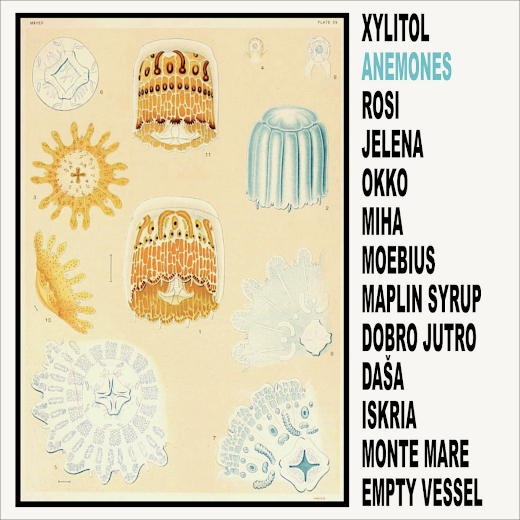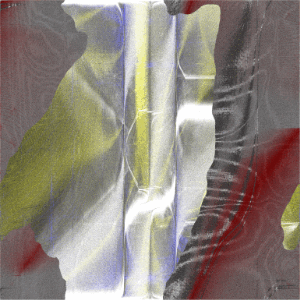I’m really enamored with how Xylitol always manages to merge these two completely unrelated universes, the almost new age aesthetics with the energy and franticness of the breaks, sometimes to a point where they don’t even merge, rather they seem to be playing separately and turn into a completely overwhelming experience.

Creating an incredibly captivating experience
There’s a lot of break-based music out there, but not much of it sounds as cute and as comforting as Anemones. This debut LP offers a joyous set of tracks, yet it never really opts for simplicity; there is some clear expertise here, the structuring and the momentum of these tracks is seriously impressive, as well as the countless variations and twists that Xylitol (aka Catherine Backhouse) throws in, which make the whole album a pleasure to revisit. Not to mention that it also flows exceptionally well, not because of transitions or a continuous mix, rather because the tracks just seem to follow one another effortlessly. There’s a fantastic balance between energetic and relaxing moments that’s held so strong by the cohesive sound palette of the album. The synthesizers are also always so smooth, so warm and comfy, the timbre itself is enough to make them as satisfying as they are, really.
That being said, Anemones isn’t just “vibes” and “mood,” it’s actually competent, it knows how to and when to impress and doesn’t rely simply on its aesthetics.
After a brief introduction with “Rosi,” which is pretty distinct from the rest of the LP given how dry it is, the wonderful “Jelena” opens things up—quite literally, this track is really really spacious.
I love how Xylitol really rewards you, she takes a lot of time to make these pieces boom; the wait is also incredibly entertaining first and foremost, but even if it wasn’t, the moment these tracks pop is so rich that you wouldn’t mind waiting either way. “Jelena” starts off really gently, there’s no low end at all for the first two minutes, and the synthesizers are so thin and far away that they almost sound like they weren’t mixed properly. Once the track explodes you really understand how perfectly everything plays out, because those same synths sound so detached from the track’s booming beat that they ultimately become psychedelic background components, as if they were playing from another room. This makes the piece incredibly immersive, you can’t really stop jamming to the frantic breaks on top, but you can also immerse yourself in the wonderful, wonderful accompaniment that’s behind them, creating an incredibly captivating experience: it really is odd how they manage to operate together, but they hella do!
An exhilarating fest ::
Following this mesmerizing piece, “Okko” takes things into serious business instead. It’s the only piece on the album I’d call truly intense, as the breaks are beyond spastic here; they’re really intricate as well, they don’t solely rely on their intensity, as often times there’s various repetitions of a certain shuffle, some sudden glitching, some stutters that effortlessly go back into the main groove, this piece really knows how to always keep you engaged. There’s so many of these tricks that I can’t help but be amazed at how well the track maintains its energy, it is seriously impressive.
On top of that, you get the best climax of the whole LP, which makes the piece go from a fantastic jam to a total masterpiece; the beaks I just described go totally nuts, there is seriously not even a second of rest: the main groove stutters, and then immediately after it goes back to its lead pattern, then it glitches beyond being broken, then directly goes back to its lead pattern, and it does this again and again and again—and each new variation seems to be more exciting than the previous. It’s absolutely insane, and it gets to a point where it doesn’t even feel like there’s a proper rhythm anymore and it’s instead just spazzing all over the place! The beats alone make this part stellar, but the lead melody is also fantastic, it’s so hypnotically pleasing that it adds a great dab of color to these maniacal beats; it’s also the introduction of a bassline that truly makes the piece explode into this exhilarating fest around two minutes in.
And after such a frantic experience, might as well catch a break with “Miha,” another of this album’s many highlights. Together with “Maplin Syrup,” they make the cutest couple in the track list, sounding like music straight out of a pixelated video game. “Miha” is especially glorious, the harmonization that joins halfway through is simply bone-melting, it’s so incredibly mellow and comfy that it might as well be honey pouring in your ears. “Maplin Syrup” is a lot more straightforward, it doesn’t really have any progression like “Miha,” it instead revolves around its super catchy loop to act more as an interlude instead of as a properly fleshed out piece—and it’s still pretty amazing.
The two tracks that follow aren’t particularly mind-blowing, and they do break the flow of the LP a bit, but they’re still really enjoyable either way. “Daša” might be the only tame track of the whole album, because even if it is really pleasing while it’s on, it doesn’t venture very far from its core loop.
A breakthrough for Xylitol ::
That being said, the last leg of the album sparks right back up, with “Iskria” being especially memorable due to how heavy it is in comparison with any other piece—that kick is PHAT!—and “Monte Mare” being yet again a fantastic drum and bass number. It acts similarly to “Moebius,” the monolith of the first half of the LP, as they both revolve around looped arpeggiated melodies that turn their seemingly eccentric breaks into almost surreal experiences.
“Moebius” is especially great at that, as that melody just does not quiet down for a single second, creating an almost chaotic piece that becomes mind-numbingly disorienting after almost 10 minutes. I’m really enamored with how Xylitol always manages to merge these two completely unrelated universes, the almost new age aesthetics with the energy and franticness of the breaks, sometimes to a point where they don’t even merge, rather they seem to be playing separately and turn into a completely overwhelming experience.
This, of course, happens throughout most of the album, which is why it is so incredibly satisfying and engaging. The cute and warm palette of this record suggests that a lot of care went into it, into how to make it work within the alien context that the breaks provide.
Turns out, it’s a massive success, so much so that given the great quality of the music, I sincerely hope its release on Planet Mu may act as a breakthrough for Xylitol, because she’d very much deserve it.




















![Ndorfik & madebyitself :: Solos EP (People Can Listen) — [concise]](https://igloomag.com/wp/wp-content/uploads/2025/04/ndorfik-madebyitself-solos_feat-75x75.jpg)








